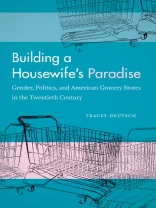Supermarkets are a mundane feature in the landscape, but as Tracey Deutsch reveals, they represent a major transformation in the ways that Americans feed themselves. In her examination of the history of food distribution in the United States, Deutsch demonstrates the important roles that gender, business, class, and the state played in the evolution of American grocery stores.
Deutsch’s analysis reframes shopping as labor and embeds consumption in the structures of capitalism. The supermarket, that icon of postwar American life, emerged not from straightforward consumer demand for low prices, Deutsch argues, but through government regulations, women customers’ demands, and retailers’ concerns with financial success and control of the ‘shop floor.’ From small neighborhood stores to huge corporate chains of supermarkets, Deutsch traces the charged story of the origins of contemporary food distribution, treating topics as varied as everyday food purchases, the sales tax, postwar celebrations and critiques of mass consumption, and 1960s and 1970s urban insurrections. Demonstrating connections between women’s work and the history of capitalism, Deutsch locates the origins of supermarkets in the politics of twentieth-century consumption.
Sobre el autor
Tracey Deutsch is assistant professor of history at the University of Minnesota.












